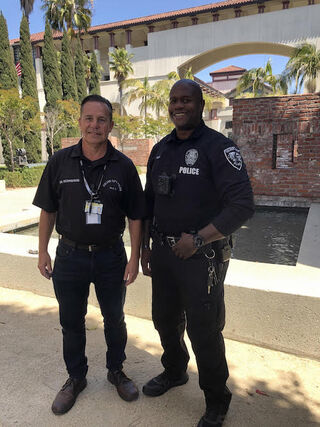Career
What Is It Like to Be a Mental Health Police Officer?
An interview with a mental health crisis intervention specialist.
Posted May 6, 2021 Reviewed by Lybi Ma
Key points
- Officer Thomas offers advice about how to decriminalize those experiencing homelessness or a mental health crisis.
- If you see a person physically harming themselves or causing serious public disturbance, local law enforcement can help compassionately.
- It's important to recognize that anyone can suffer from a mental health crisis. We all need to de-stigmatize these struggles.

On most Tuesday mornings, Officer James Thomas of the Culver City Police Department is found at the intersection of Venice and Sepulveda Boulevards. For the past year, along with a group of fellow officers and volunteers, he is part of a cleanup team in charge of removing trash and handing out items to the unhoused residents, like bottled water, personal hygiene products, and clean socks. He said that in 2020 the department assisted in the clearance of around 40 tons of garbage.
Officer Thomas has spent the past year and a half serving as the mental health crisis intervention officer at his station. A substantial part of his job addresses the concurrent mental health and homelessness crises. The pandemic has exacerbated both of these societal issues, and I was eager to speak to him about both.
What is a typical day like for your job?
Some days, I’m responding to calls from the station. With someone dealing with a serious mental health situation, calls can take minutes or several hours. Recently, a gentleman from Texas called because his daughter was hospitalized locally for a mental health issue and he didn’t know what direction to go. We talked for a while and chased down the information he needed to look into care for his daughter. Those kinds of experiences are really meaningful to me.
I’m also in the field a lot responding to calls. My partner is a clinician from the department of mental health and rides with me Monday through Thursday. I’m also on the homeless outreach team. In my patrol car, I carry a hockey bag in the back with nonperishable foods, blankets, socks and basic necessities I can hand out to those in need, but who don’t meet the criteria to be hospitalized or enter a treatment program.
What are those criteria?
I cannot admit a person to a hospital or treatment facility who is not voluntarily choosing to do so, unless the person is in immediate danger, or they are putting someone else’s life in danger. That’s a critical element of my work.
The questions I ask: Are you a danger to yourself or others? Do you hear voices, see things that aren’t there? Are you greatly disabled? This last question can have different criteria based on where someone lives. For example, in Minnesota living outdoors in the winter without adequate clothes or shelter qualifies as greatly disabled, but not here.
What changes have you seen due to the pandemic?
More calls from and about juveniles. Young people have worlds built around their schools and friends and they didn’t really have that [during the pandemic]. We try to give their parents resources. It helps if parents are supportive, but at times, parents are experiencing their own issues. In general, we try to convey to adults that their kids are not abnormal or weird; they are going through their own struggles.
Another thing that changed: most people are home, sometimes bored and stressed out. There seems to be heightened anxiety. We get a high volume of calls to the station reporting about the homeless these days. I have to gently remind people that it’s not a crime to be homeless.
When is it appropriate to make a call to the police about behavior in public?
If you see a person physically harming themselves or causing serious public disturbance. For example, I was called about a woman who was experiencing a mental health crisis; she was nude and throwing food at passing cars and we intervened to help her. I created a worksheet at my station about these protocols so that any officer can discuss this on the phone when they are answering calls. I have also tried to set an example with my mental health evaluation reports. I didn’t like how I’d seen reports written in the past using “suspect” so in my reports I use the word “patient.”
What can the community do more to help or to become more involved?
- Go to city council meetings to support housing and mental health programs.
- Don’t criminalize homeless and mental health issues.
- Be safe and be smart. Sometimes petty theft has occurred, and the victim of the theft goes to a homeless encampment looking for their stolen stuff. Don’t do that.
What do you think makes you suited for this kind of work?
I’ve always been a patient person. I’ve been to war twice. You have to figure out where the calm is. It’s funny, I never thought I’d be a cop. I was in the military and I’m in the reserves now. The military was my thing and when I became a police officer, the mental health aspect was just a blip in the academy training, but years later a mental health intervention position opened and one of my supervisors thought I should apply for it. Now, here I am, and I can’t imagine doing anything else. When I retire, I’d like to get my doctorate in psychology and do what my partner does as a clinical psychologist.
What’s one of the big things you’ve learned from this job?
I’ve noticed that people are hesitant to admit they are suffering from a mental health crisis, especially people who feel like it could never happen to them, that because they are, say, well-educated, or highly skilled, that mental illness couldn’t “happen” to them. That’s simply not the case. We are all this shy of being committed (he laughs loudly). Covid has allowed people to see that often we are just one paycheck away from being homeless. We are all human.




